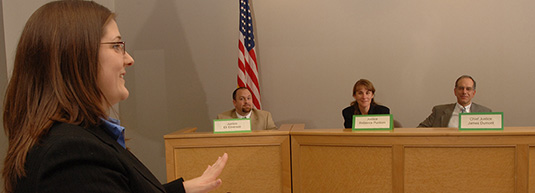
APPELLATE ADVOCACY PROGRAMWELCOME!
Welcome to Vermont Law & Graduate School’s Appellate Advocacy page! Appellate Advocacy is an upper-level writing course students take in the summer or fall of their second year at VLGS. In this course, students practice advanced advocacy techniques through drafting a U.S. Supreme Court brief and presenting oral argument before a panel of volunteer judges. Fall 2025 CASES AND DATES In 1996, Holsey Ellingburg, Jr., was sentenced to 322 months imprisonment for bank robbery. The sentencing court also ordered him to pay $7567.25 in restitution. At the time, 18 U.S.C. § 3613 allowed the government to enforce a restitution order for 20 years after the date on which the order was imposed. Under that provision, Ellingburg’s restitution liability would expire in 2016. But shortly after Ellingburg was sentenced, Congress amended § 3613, changing the liability term to 20 years following the date of a person’s release from prison. Under the amended provision, Ellingburg is liable for restitution until 2042. Colorado and many other states prohibit licensed mental health professionals from engaging in conversion therapy with minor patients. Conversion therapy is any practice or treatment that attempts to change an individual's sexual orientation or gender identity. Kaley Chiles, a licensed counselor, treats minor clients, some of whom want to discuss their gender identity and sexuality. Chiles alleges that Colorado's law prohibiting conversion therapy for minors abridges her freedom of speech under the First Amendment of the U.S. Constitution by restricting the content of her counseling conversations. The Supreme Court granted certiorari to determine whether Colorado's law violates the free speech clause of the First Amendment or whether it lawfully regulates professional healthcare treatment to protect patients from substandard care. Defendant Trevor Case appeals the Montana Supreme Court’s affirmance of his conviction for Assault on a Peace Officer. In affirming, the Montana Court held that the district court properly denied Case’s motion to suppress evidence obtained after officers responding to his threat of suicide entered his home without a warrant. The Court found that officers acted in accord with their caretaker obligations when they entered Case’s home because “when a warrantless entry is wholly divorced from a criminal investigation and is otherwise reasonable, the probable cause element is ‘superfluous’ and should not impede an officer’s duty to ensure the well-being of a citizen in imminent peril.” The United States Supreme Court will decide whether law enforcement may enter a home without a search warrant based on less than probable cause that an emergency is occurring, or whether the emergency-aid exception requires probable cause. Notice to Students: Students must, as always, adhere to the honor code. You may not review any briefs filed with the Supreme Court or any lower court pertaining to the Appellate Advocacy cases, including earlier cases in the procedural history. |